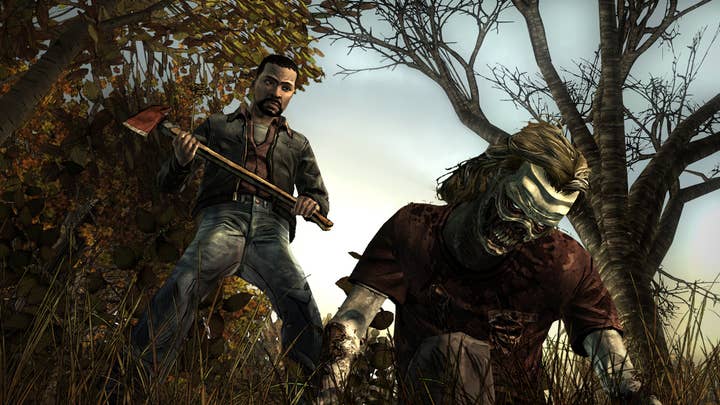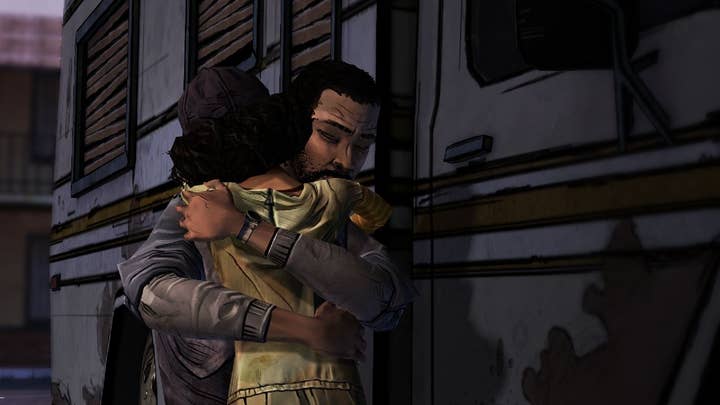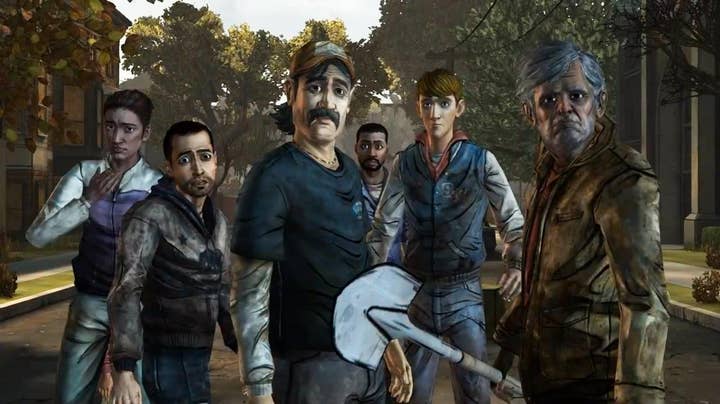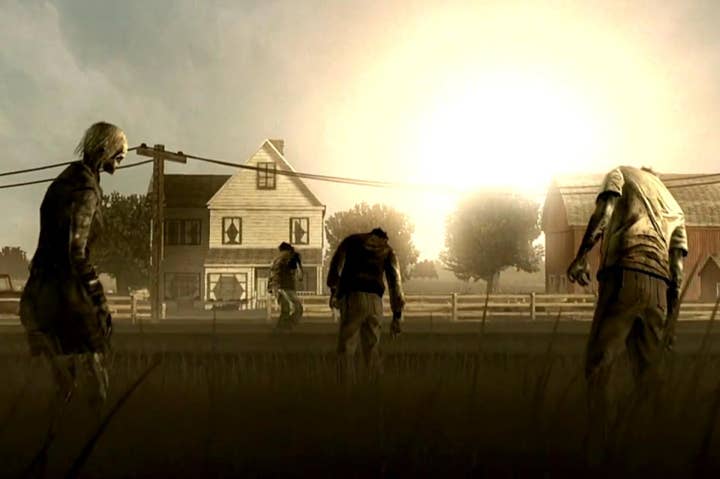Tales Of The Unexpected: The Strange Success Of The Walking Dead
Dan Connors and Kevin Boyle on giving violence its proper place in last year's most surprising smash hit
On any given year, my favourite gaming moment is likely to involve an act of aggression. A gun battle, a fistfight, an all-out war. With guns or lasers, in landscapes both historically derived and entirely imaginary. There was that unexpected tangle between a giant and a dragon, with me caught in the middle. The blithe destruction of a small town against a vast irradiated wasteland. A flamboyantly brutal siege set to Tchaikovsky's Waltz of the Flowers. In 2009, it was a down-and-dirty brawl with a renaissance-era Pope.
Last year was somewhat different. Last year, the moment that lingered on as the others began to fade involved digging a hole. There was no treasure at its bottom. The last thrust of the spade didn't reveal a hidden Nazi bunker or a race of sub-surface humanoids bent on world domination. It was just a hole in the ground, laboriously dug to house the body of a young boy, who died alone in an attic as the world went to hell just outside his window. In terms of gameplay it was inescapably mundane, but in the context of The Walking Dead it was a moment of resonant valediction - simple button presses translated to something approaching profundity.
"From the start we wanted the violence to be in its proper place. We wanted the violence to come with regret and consequence, so you couldn't always feel good about it"
Kevin Boyle, executive producer
Thanks to moments like this, Telltale Games emerged as one of the true winners of 2012, though few could have predicted that outcome. After seven years of refining its progressive episodic model with a string of cannily licensed products, the company appeared to hit a creative wall with Jurassic Park. The winning combination of goofy humour and abstruse puzzles that buoyed Sam & Max, Tales of Monkey Island, Wallace & Gromit's Grand Adventures and Back to the Future was gone, replaced by a more straight-faced, hands-off approach that positioned the player as more of a spectator than a participant. At present, Telltale has a career Metacritic average of 76 per cent. Jurassic Park: The Game didn't make it out of the 50s.
"Jurassic Park was really us stepping out of that comedic content area and towards dramatic content," says Kevin Boyle, executive producer on both Jurassic Park and The Walking Dead. "In a way that was really the stepping stone that allowed us to get to The Walking Dead.
"One of the things I really looked to was that [in Jurassic Park] we were taking the player on this thrill-ride, but they weren't really driving. They didn't have ownership over their choices and their relationships and what happens. They're going along with a story as it's being told, as opposed to crafting the outcome for themselves. We really took that criticism to heart, and it allowed us to put those choices at the core of The Walking Dead."

Indeed, Jurassic Park's similarities to The Walking Dead are striking. In their moment-to-moment gameplay neither is particularly interactive, with long stretches of time passing between sequences of limited exploration and rudimentary puzzles. The gulf between the way the games were perceived by the press is substantial, but the truth is that Telltale's approach to design is broadly similar in both. For Boyle, so used to assimilating user feedback between episodes of any given series, the way forward was clear. Interactivity could be about more than just pushing buttons and solving riddles. In terms of storytelling, just a little extra agency would go a long, long way.
The Walking Dead was an ideal test-bed for these new ideas. Robert Kirkman's morally opaque and brutally violent comic was full of tough, high-stakes decisions that constantly played with the way the reader perceived the characters, and the way the characters perceived each other. If Jurassic Park was a step away from the light touch of Telltale's previous work, with the right execution The Walking Dead could be a running jump.
Here's the thing: Telltale didn't just adapt The Walking Dead into a video game; it created the definitive version of Robert Kirkman's nihilistic universe. On a personal level, I stopped reading the comic due to its glib, off-hand way with violence. Of course, that could be seen as essential to what Kirkman was trying to achieve, but the brutality meted out to the characters often seemed needlessly excessive, even gleeful. Telltale's The Walking Dead doesn't go to such gratuitous extremes, but it is no less bleak, and all the more powerful, as a result.
"You shudder with every blow of the axe. That's something that the medium has at its disposal. How to properly use it is for creators to figure out as they go forward"
Dan Connors, CEO
"There's definitely more in the realm of, say, sexual assault in the comic book than we ever did in the game," Boyle says. "You'd have to handle that so delicately, and that just didn't fit in with the story that we wanted to tell. But the violence, and people turning on each other, I feel that we did a good job of staying true to just how gruesome the comic can get.
"We did go to violence towards children in the game, but in a way that was kind of sombre and awful. From the start we wanted the violence to be in its proper place. I've played so many games with zombies in which you feel great about just mowing down tons of them. We wanted the violence to come with regret and consequence, so you couldn't always feel good about it, and mostly you felt bad about it. I feel that the content goes to that place where it can be pretty gruesome, but we always keep it in that context."
Both the comic and the TV show linger over scenes of violence and stress to create the appropriate impact, but the interactive nature of gaming gave Telltale a unique advantage. When, at the start of the second episode, Lee needs to choose between cutting off a character's leg or leaving him for the approaching zombies, the gravity of the situation is amplified by the fact that it is at the player's behest that Lee raises the axe. Compared to the violent rape and decapitated children of the comic a severed leg is relatively tame, but that sense of complicity changes everything.
"With the leg-chop, people couldn't bear to hit the button any more," says Dan Connors, co-founder and CEO of Telltale. "They didn't want the responsibility of making the character feel that way, and that felt like a real accomplishment. You shudder with every blow of the axe. That's something that the medium has at its disposal. How to properly use it is for creators to figure out as they go forward."
After a year laden with discussions of violence in video games The Walking Dead feels refreshing, even vital. Here, the violence is fraught, desperate, messy, occasionally sombre, but never fun. It isn't the first time that a game has attempted to attach more than a burst of adrenaline to its bursts of mayhem - Bioshock springs to mind, as does Spec Ops: The Line - but generally speaking they are isolated moments shrouded in hour upon hour of consequence-free slaughter. The Walking Dead, on the other hand, never once falters in its intent to keep violence "in its proper place," and for that reason alone it is remarkable. One can only hope that it's queued up and ready to download on Joe Biden's Steam account.
"It's really at the core of what we're doing," says Boyle. "It's not in addition to a series of other mechanics. That was the thing that we wanted to get across. It's centre stage in the game.

"It's about the emotional response to the storytelling and the interactivity as opposed to the visceral response and the surge of adrenaline. That's not very well explored [in games], and that's really what we were setting out to do. That's the opportunity. That's where The Walking Dead's power lies."
Where so many games rely on violence as both the means and the end, Boyle regards the violence in The Walking Dead as, "a strong tool to give consequence to decisions, or to make decisions harder." The game's violent sequences aren't powerful because they are violent; they are powerful because the player is emotionally invested in the outcome. According to Connors, the same theory could be applied to any dramatic situation, zombie apocalypse or no zombie apocalypse.
"For the industry in general, this idea that you can provide depth to the world and the characters in a way that isn't just about them being an enemy or an obstacle to overcome is an area that there's a lot of room to succeed in, and something that there'll be a lot of demand for," he says. "There's no reason why any drama shouldn't be able to be an interactive experience. It's just that, right now, that audience isn't the obvious choice for the games industry. That isn't the audience that the industry generally speaks to."
"If developers are looking to take something away from The Walking Dead, we could do worse than to have an industry that's moving towards spending more pre-production energy on writing"
Kevin Boyle, executive producer
Indeed, Telltale's laser focus on creating believable, empathetic characters worked almost too well. Boyle claims that it was "hard work" to devise situations dire enough for players to see death as an attractive solution, even when it came to unpopular characters like the abrasive, belligerent Larry. Time and time again, players would tend towards the least destructive option, and if Clementine or Kenny were watching it was highly unlikely that Lee would end up pulling the trigger.
"You hear all of this talk about how players can't wait to get rid of so and so - 'so and so is dead as soon as I have the chance'. But you sit them down with a controller and you get a completely different reaction," says Boyle. "The average player out there is fairly sympathetic, even to horrible people.
"If there are developers looking to take something away from The Walking Dead or our process, we could do worse than to have an industry that's moving towards spending more pre-production energy on writing."
But The Walking Dead is significant in terms of more than just content. Its victory at last year's Spike VGAs was an unlikely success story, and all the more so because every previous winner of game of the year was a full-price retail release. That Telltale earned the accolade with a digitally-distributed episodic game is significant not only of the rapidly changing times, but also the distinct strengths of the form. More than any other product in Telltale's portfolio, The Walking Dead left players hanging between episodes, desperate to find out what happened next. Like the best TV shows, it was water-cooler entertainment.
"That space between episodes really gave players the time to have Lee and Clementine in the front of their minds," says Boyle. "And I don't know that we could have established such a strong connection if it wasn't for the episodic format."
"I think the fact that had this anticipation building between episodes every month, so it was this sustained experience from April till November, that all played into its success," adds Connors. "It was our best execution of the episodic model to date."
After ploughing its own furrow for so long, it's likely that Telltale will now be flattered by imitators. The episodic model has been associated with the company since its inception, but The Walking Dead has attained a level of success and recognition that very few developers enjoy. "We've shown that it can be really big business, it's going to get far more people interested in trying to execute it," says Connors. "We definitely believe that it's a viable way to deliver content, and it's consistent with the way people consume content in 2013."
This is lent credence by the way that The Walking Dead bucked the trend of games selling strongly for a few weeks then rapidly dying away - particularly on consoles. The episodic format helped to keep the audience engaged with the story, but it also sustained the conversation around the game, pulling more and more people in as the season progressed. When new customers decided to take the plunge, even as late as the fourth or final episode, the conversation was far from over. The experience still had gathering momentum.

That was particularly true on iOS, where Telltale gave the first episode away for free. Despite being a paid download, this concession to the App Store's dominant business model kept The Walking Dead high in the free charts, significantly increasing its visibility. Even now, with the season over, interest in the game on iOS is strong, and Connors anticipates another spike in popularity when the TV show starts up later this year.
"What we're seeing right now on iOS, where it's more of a mainstream audience than a gaming one, is that people are becoming more and more aware of it the longer it's out there and the more plaudits it receives," says Connors.
"This is the first instance that we've really seen the popularity of the franchise grow from launch time to the finale [on all formats]. It became a must-play, you-must-get-involved-in-this type of thing, and by the time it was done it had all this momentum and a whole bunch of discussion around it. That really gave it the legs to keep going."
But this isn't evidence of a fool-proof strategy for guaranteed digital dollars. People talked about The Walking Dead between episodes because it gave them something to talk about. Those that downloaded the first free episode on iOS paid for the next one because the experience justified the expense. Whatever can be said about Telltale's business strategy or knack for picking licenses, the success that followed was directly proportional to the quality of the product.
"The Walking Dead is really just the tip of the iceberg for how interactivity can enhance storytelling. That's where we've been driving towards since we started"
Dan Connors, CEO
The Walking Dead strikes such a fine balance between gameplay and story, between abstraction and immersion, that it was embraced by the entire spectrum of the gaming audience. First-person shooters and RPGs may top the sales charts at the end of a typical year, but as the addressable market grows the limits of their appeal become increasingly obvious. They demand a prior knowledge and understanding that the casual audience will need time to acquire, if it has the impetus to do so at all. It has taken eight years for this gap in the market to form, and Telltale intends to fill it with that most universal of entertainments: a damn good story.
"We had a lot of other things in place, like distribution, like the episodic production model, like the ability to attract huge licenses. So the idea that the gameplay formula needed to be right and people needed to respond to it was the big thing to be solved," says Connors.
"Historically, we've been dismissed with, 'I heard about Telltale, I heard about Sam & Max, that's cool but I don't like adventure games'. We knew we needed to have people sit down and think we'd made a good game - and by that I mean everybody. At its core, The Walking Dead has that, and that's why it won game of the year."
"Interactive storytelling is a bit of a holy grail for games. People have been working on it forever, but in my mind it's the area where there's the most room for exploration and the most opportunity to be revealed. It was so interesting in The Walking Dead to see how people respond to being able to interact with characters and be a part of the story in that way - basically having a suspension of disbelief for 2.5 hours that's greater than anything they get from a movie or a TV show.
"That was a big deal for The Walking Dead, and it's really just the tip of the iceberg for how interactivity can enhance storytelling. That's where we've been driving towards since we started. It's the question we live with on a daily basis."






.jpg?width=291&height=164&fit=crop&quality=80&format=jpg&auto=webp)


